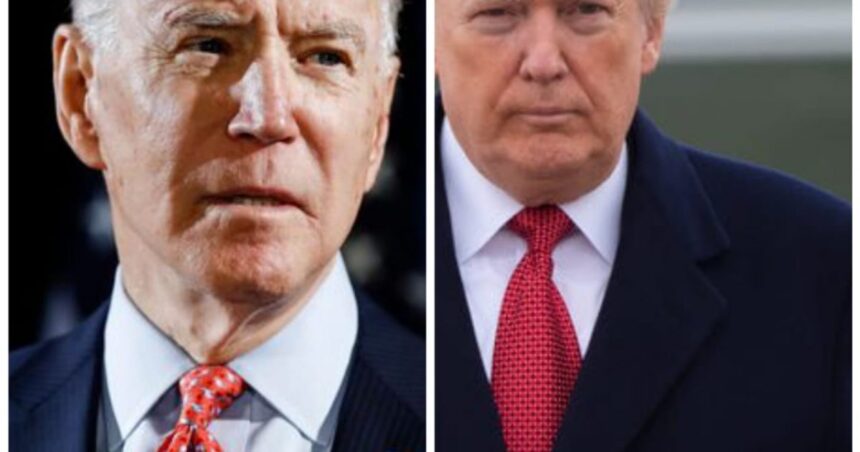The makeup of the 2024 US elections has long been a foregone conclusion, with a rematch between the two presidents seeming almost certain.
PUNCH Online reports that the 2024 US elections are scheduled to take place on Tuesday, November 5, 2024.
During this presidential election year, the president and vice president will be elected.
On September 16, 2024, the first presidential debate for the general election will take place at Texas State University in San Marcos, Texas. The second and third will be held on October 1 and 9 respectively.
The second will take place at Virginia State University in Petersburg, Virginia, while the third is planned for the University of Utah in Salt Lake City.
Meanwhile, incumbent President Joe Biden, a member of the Democratic Party, is running for office while his predecessor Donald Trump, a member of the Republican Party, is running for a second non-consecutive term.
PUNCH Online also reports that this is the first presidential rematch since 1965, the 46th US election between President Dwight Eisenhower who was seeking re-election against Adlai Stevenson II.
But what would happen if, for various reasons, one of the two candidates failed to participate in the November vote? Beyond immense political confusion, here is what would happen, according to the rules and the experts:
– Why not on the ballot? –
What would prevent President Joe Biden, an 81-year-old Democrat, or former President Donald Trump, a 77-year-old Republican, from running for office?
Age for one. Either candidate would take office in January 2025 as the oldest U.S. president ever.
Although neither has reported serious health problems, statistics suggest that both face an increased risk of mortality or serious medical incidents due to their advanced age.
What about voluntary withdrawal? “It’s a fabulously ridiculous fantasy,” said Rachel Bitecofer, a Democratic political strategist.
Even if Republicans wanted to change their rules and change candidates – if, for example, the polls took a disastrous turn following a legal conviction of Trump – “they still wouldn’t do it, because it would cause a total collapse of their base” .
Biden regularly asserts that he is the most qualified candidate, despite polls that indicate his age turns off voters.
“What are you supposed to say, ‘Oh, he’s fine, he’s going to run a triathlon tomorrow’? I mean, he’s 81 years old,” Democratic Rep. Adam Smith said. Still, “no one of note has decided to run against him, so here we are.”
Meanwhile, Trump insists he will run despite a possible criminal conviction before the election that could theoretically see him face decades in prison.
– If a candidate leaves –
To nominate a party’s official nominee, delegates from each state attend their party’s summer nominating convention to officially anoint a candidate based on the primary vote.
If either Biden or Trump were to leave the race before the end of the primaries, the final say would go to the delegates at the convention.
And those delegates, Elaine Kamarck of the Brookings Institution said in a recent brief, are “8,567 people you’ve never heard of,” ordinary Americans who happen to be politically active.
This has not happened since President Lyndon B. Johnson announced on March 31, 1968 – in the middle of the Vietnam War – that he would not run for re-election.
Since then, the conventions have been well-oiled affairs, the results of which are known in advance since they are determined by the primaries.
But this year, a candidate’s departure could result in “a convention whose outcome might not be known in advance…the kind of no-holds-barred event that nominating conventions held between 1831 and 1968,” Kamarck said.
What if something happened to one of the candidates after they were officially nominated at the convention?
One of the parties’ official governing bodies, the Democratic National Committee or the Republican National Committee, would nominate a new candidate in a special session.
On the Republican side, the RNC is undergoing a shakeup and Trump has suggested placing his daughter-in-law Lara in a leadership role, which would give his camp enormous influence in choosing a replacement.
– Who could replace him? –
A strong – but not automatic – candidate to take Biden’s place would be his vice president, Kamala Harris, who is already part of his campaign.
Otherwise, any of a number of strong Democratic politicians — Gov. Gavin Newsom of California, Gretchen Whitmer of Michigan and Josh Shapiro of Pennsylvania are mentioned — could be tapped.
But Trump has not yet announced his choice for vice president.
And as Hans Noel, a government professor at Georgetown University, pointed out, Trump belittled his party’s other heavyweights throughout the primaries.
Chief among them is Florida Governor Ron DeSantis, who was relentlessly targeted by Trump before ending his candidacy.
Also at the top of the list is Nikki Haley, the only serious candidate, besides Trump, left in the Republican primaries – but who is hated by loyal Trump supporters.
“Nikki Haley might have been well positioned to be an alternative before,” Noel said, but by continuing to fight the party favorite, she lost the support of “everyone who loves Trump.”
In the meantime, could a strong third-party candidate emerge? So far, no independent candidate poses a danger to the dominant two-party system in the United States.
In 1992, Texan billionaire Ross Perot, an independent candidate, managed to win nearly 19% of the votes cast.
But in the end, due to the vagaries of the American electoral system, he did not obtain a single one of the votes that matter most: those of the 538 members of the Electoral College who ultimately decide the winner.
AFP




